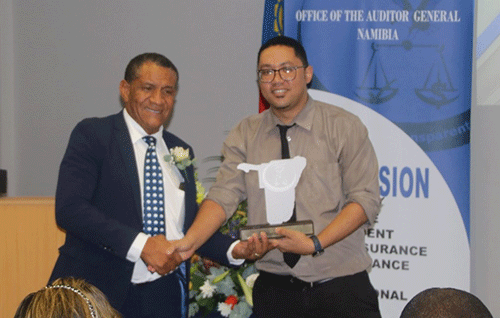Auditors in the public service play key roles in examining financial records, identifying potential areas of opportunity and risk, and helping government offices, ministries and agencies find solutions.
It is the role of auditors, like Lorenzo Bock, to ensure the accuracy of financial records, evaluate financial operations and work to ensure public institutions are economically, efficiently and effectively run.
Bock is a value-for-money/performance audit supervisor at the Office of the Auditor General (OAG) in Windhoek.
According to him, value-for-money audits are key to ensuring an organisation achieves its objectives and is economically and efficiently run.
Bock spoke to New Era this week ahead of the OAG Employee Recognition Award Ceremony, held Wednesday, where he was honoured with an award as an exceptional team member.
He said the OAG offers value and benefits to the Namibian citizen by ensuring, through value-for-money audits, that the Namibian citizen is provided value for money through service delivery.
“The OAG looks beyond financial audit opinions and expresses an opinion. Even though an institution received an unqualified audit opinion, did the Namibian citizen receive value for money through service delivery, or whether Namibia as a country is conducting operations sustainably for future generations,” he said.
Born and bred in Rehoboth, in the Hardap region, Bock has been working for the public sector for the past eight years. He started as a value-for-money and performance auditor trainee at the OAG on 2 February 2015. He was later promoted to the supervisor position.
His main responsibility is to review the work of trainees and senior auditors, as well as to provide guidance to auditors during audits.
“I also support the strategic objectives of the OAG through various committee work as well as recruit and train new auditors. Moreover, my audit work through my audit team must ensure the environment is sustainably managed for future generations,” he said.
“I am more than just a mere financial auditor; I have experience in environmental and occupational health and safety audits in the private and public sectors in various sectors, among them mining, fishing and finance.
“To be a value-for-money auditor, you need to be more than a financial auditor. One needs to go beyond normal financial audit opinions. I believe I am more than a simple financial auditor at the OAG and can see beyond financial audit opinions by exposing institutions whose operations affect the private sector on whether their operations are economic, efficient and effective – and whether their operations are causing harm to the environment.”
Before joining the public service, Bock worked as a group accountant in the private sector, focusing on trusts, horticulture and agriculture, and investment operations.
He described himself as a down-to-earth person who loves nature and farming. “I live according to rules, which are a bit old-fashioned or primitive, but it keeps me disciplined and ethical,” he said.
“It is a dream to work for the highest audit office in Namibia. I will retire at the OAG because of the excellent culture of integrity,” he said.
Challenges
Bock observed that the concept of value-for-money audits is not well understood by private and public operations.
“You must conduct your operations economically, efficiently and effectively. Most institutions are stuck with financial audit opinions, such as qualified, non-qualified, adverse and disclaimer, which are not economical, efficient and effective,” he said.
He, however, said what is satisfying about his job is working in a team and auditing topics that affect every Namibian citizen.
As part of his work, Bock said they have dealt with value-for-money-based audits on water supply and demand management, air quality monitoring, coastal management, mine management and rehabilitation, as well as tax collection in extractive industries.
He also found it satisfactory that he can influence the laws and regulations of Namibia through value-for-money audit report recommendations to parliament.
Public misconception
When asked to give his views on the public misconception that public servants are unproductive and inefficient, Brock had this to say: “As a Namibian citizen, I share the same misconception and have experienced the same sentiment when conducting audits.
“However, as a public servant working at the OAG and auditing government institutions, it is expected of auditors to have integrity because we are auditing the entire government and conducting check-ups at private institutions. There is no time to be unproductive. OAG does not value a lazy culture; therefore, I do not agree with the sentiment when taking OAG into consideration.”
Meanwhile, his main wish is for the OAG to become the biggest trainer of trainee auditors for professional qualifications, such as the Association of Chartered Certified Accountants, the Institute of Chartered Accountants of Namibia and other specialised fields.
Individually, he wishes to maintain his “hunger for excellence and development through learning.”


